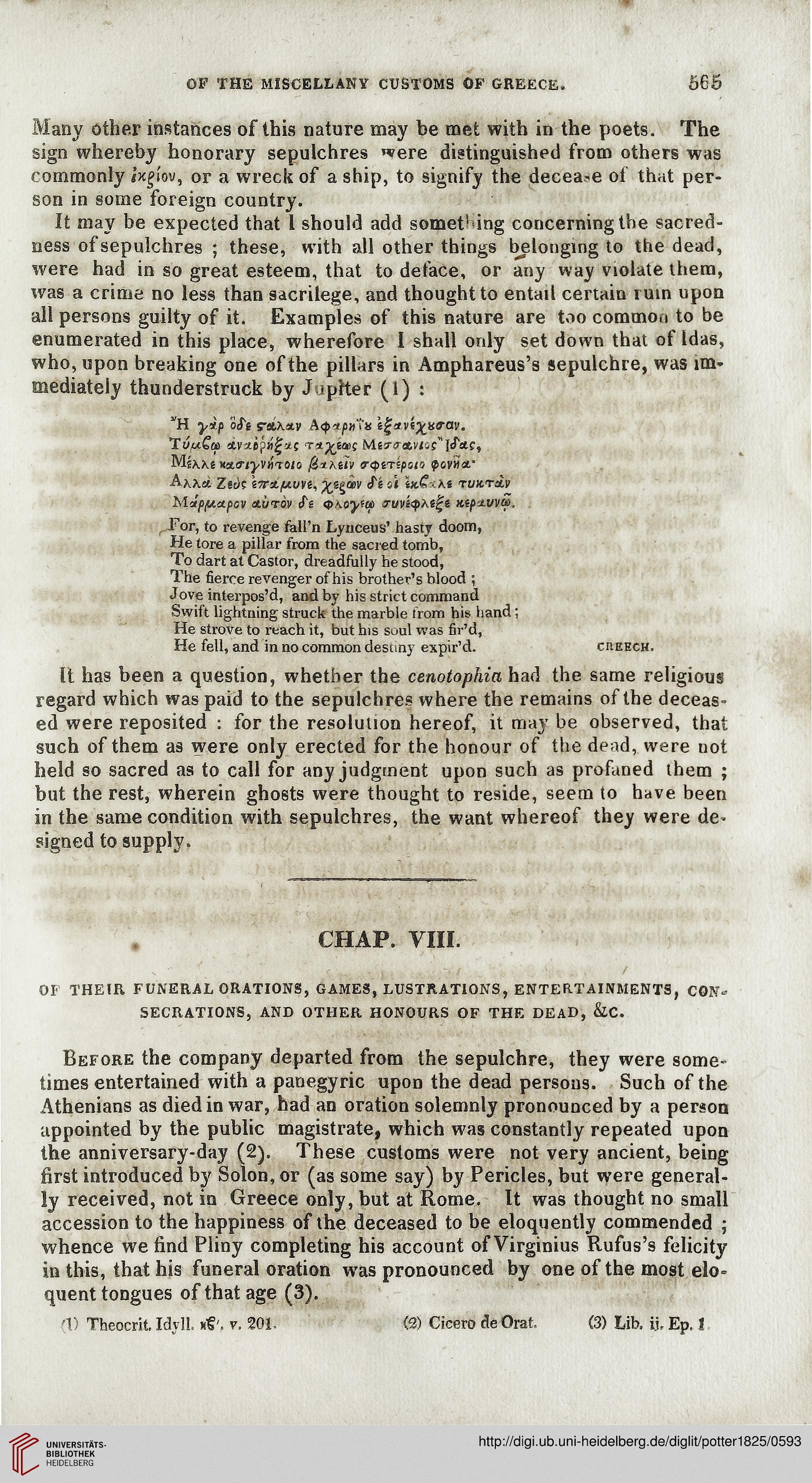op the miscellany customs of greece. 565
Many other instances of this nature may be met with in the poets. The
sign whereby honorary sepulchres '*ere distinguished from others was
commonly ixgi'ov, or a wreck of a ship, to signify the decease of that per-
son in some foreign country.
It may be expected that I should add something concerning the sacred-
uess of sepulchres ; these, with all other things belonging to the dead,
were had in so great esteem, that to deface, or any way violate them,
was a crime no less than sacrilege, and thought to entail certain rum upon
all persons guilty of it. Examples of this nature are too common to be
enumerated in this place, wherefore I shall only set down that of Idas,
who, upon breaking one of the pillars in Amphareus's sepulchre, was im-
mediately thunderstruck by Juprter (1) :
IvuGm dvj.if»%*; Titian; M63-?«v<it*I<r«f,
M{\X6 *a.<Ttyvmoto /ZiAih v^irifoio pov»ar
Ak\cL Zftic STrst^vve, ^sgw ft oi titC'.Ki ruicriiv
Map/netflCV Itl/rOV (Ti <p\0J<fa> J-UVi^hi^i Hif-JiUVte,
^or, to revenge fall'n Lynceus' hasty doom,
He tore a pillar from the sacred tomb,
To dart at Castor, dreadfully he stood,
The fierce revenger of his brother's blood ;
Jove interpos'd, and by his strict command
Swift lightning struck the marble trom his hand;
He strove to reach it, but his suul was fir'd,
He fell, and in no common destiny expir'd. ciieech.
II has been a question, whether the cenotophia had the same religious
regard which was paid to the sepulchres where the remains of the deceas-
ed were reposited : for the resolution hereof, it may be observed, that
such of them as were only erected for the honour of the dead, were not
held so sacred as to call for any judgment upon such as profaned them ;
but the rest, wherein ghosts were thought to reside, seem to have been
in the same condition with sepulchres, the want whereof they were de-
signed to supply.
CHAP. VIII.
of their funeral orations, games, lustrations, entertainments, con-
secrations, and other honours of the dead, &.C
Before the company departed from the sepulchre, they were some-
times entertained with a panegyric upon the dead persons. Such of the
Athenians as died in war, had an oration solemnly pronounced by a person
appointed by the public magistrate, which was constantly repeated upon
the anniversary-day (2). These customs were not very ancient, being
first introduced by Solon, or (as some say) by Pericles, but were general-
ly received, not in Greece only, but at Rome. It was thought no small
accession to the happiness of the deceased to be eloquently commended ;
whence we find Pliny completing his account of Virginius Rufus's felicity
in this, that his funeral oration was pronounced by one of the most elo-
quent tongues of that age (3).
(1) Theocrit Idyll. %t: v, 201. (2) Cicero de Orat. (3) Lib. ij, Ep. 1
Many other instances of this nature may be met with in the poets. The
sign whereby honorary sepulchres '*ere distinguished from others was
commonly ixgi'ov, or a wreck of a ship, to signify the decease of that per-
son in some foreign country.
It may be expected that I should add something concerning the sacred-
uess of sepulchres ; these, with all other things belonging to the dead,
were had in so great esteem, that to deface, or any way violate them,
was a crime no less than sacrilege, and thought to entail certain rum upon
all persons guilty of it. Examples of this nature are too common to be
enumerated in this place, wherefore I shall only set down that of Idas,
who, upon breaking one of the pillars in Amphareus's sepulchre, was im-
mediately thunderstruck by Juprter (1) :
IvuGm dvj.if»%*; Titian; M63-?«v<it*I<r«f,
M{\X6 *a.<Ttyvmoto /ZiAih v^irifoio pov»ar
Ak\cL Zftic STrst^vve, ^sgw ft oi titC'.Ki ruicriiv
Map/netflCV Itl/rOV (Ti <p\0J<fa> J-UVi^hi^i Hif-JiUVte,
^or, to revenge fall'n Lynceus' hasty doom,
He tore a pillar from the sacred tomb,
To dart at Castor, dreadfully he stood,
The fierce revenger of his brother's blood ;
Jove interpos'd, and by his strict command
Swift lightning struck the marble trom his hand;
He strove to reach it, but his suul was fir'd,
He fell, and in no common destiny expir'd. ciieech.
II has been a question, whether the cenotophia had the same religious
regard which was paid to the sepulchres where the remains of the deceas-
ed were reposited : for the resolution hereof, it may be observed, that
such of them as were only erected for the honour of the dead, were not
held so sacred as to call for any judgment upon such as profaned them ;
but the rest, wherein ghosts were thought to reside, seem to have been
in the same condition with sepulchres, the want whereof they were de-
signed to supply.
CHAP. VIII.
of their funeral orations, games, lustrations, entertainments, con-
secrations, and other honours of the dead, &.C
Before the company departed from the sepulchre, they were some-
times entertained with a panegyric upon the dead persons. Such of the
Athenians as died in war, had an oration solemnly pronounced by a person
appointed by the public magistrate, which was constantly repeated upon
the anniversary-day (2). These customs were not very ancient, being
first introduced by Solon, or (as some say) by Pericles, but were general-
ly received, not in Greece only, but at Rome. It was thought no small
accession to the happiness of the deceased to be eloquently commended ;
whence we find Pliny completing his account of Virginius Rufus's felicity
in this, that his funeral oration was pronounced by one of the most elo-
quent tongues of that age (3).
(1) Theocrit Idyll. %t: v, 201. (2) Cicero de Orat. (3) Lib. ij, Ep. 1





